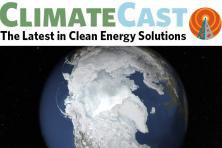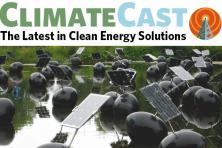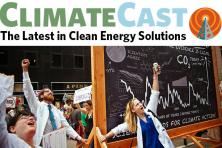PNW ballots are out. Here’s what you need to know for climate.
On November 6, Northwest voters could make climate history. In Washington State, voters can pass I-1631, a groundbreaking ballot measure that would reduce climate pollution, save lives and slash health care costs by billions. I-1631 would raise close to a billion dollars a year by imposing a carbon emissions fee on large polluters. Seventy percent of the revenue would fund clean air and clean energy projects, encourage businesses to lessen their dependence on fossil fuels, and hasten their transition to a clean energy economy. I-1631 is supported by a vast coalition of more than 400 groups ranging from large employers such as Microsoft, to unions, healthcare professional organizations, community of color organizations, tribal nations, small businesses and many more.
Portland voters will have the chance to pass a first-of-its-kind ballot measure to levy a surcharge on large companies, using the proceeds to fund clean energy projects in low-income communities of color. States, counties, and cities will of course also be voting for candidates, and Oregon gubernatorial candidates have been talking about their positions on addressing the climate crisis, including in a recent debate.
That $3 Trillion-a-Year Clean Energy Transformation? It’s Already Underway
A recent report from the Intergovernmental Panel on Climate Change (IPCC) has many people feeling worried—and rightly so. The report concludes that nations must invest an average of $3 trillion dollars a year over the next three decades in order to transform energy supply systems and move away from fossil fuel-based energy. It’s a tall order, but it is also important to note that these transitions are already happening, and much of the investment would be spent on energy systems anyway. U.S. companies are surpassing clean energy goals at a record pace, having already broken the previous full-year record. Wind and solar already make up more than 20 percent of power generation in 10 states, with more projects planned, and the cost of solar is continuing to drop faster than anyone anticipated (34 percent this year alone). Companies are also increasingly investing in battery storage technologies to support the grid and boost power reliability, another development that is helping to maximize clean energy installations.
City and state actions to save the planet
The IPCC report estimates that cities have until just 2020 to begin to reduce emissions and slow climate change in order to avoid the worst impacts. That’s not very much time, but in 27 cities, including nine in the U.S., climate emissions have already peaked, with climate action plans that demonstrate how to begin reducing emissions even as populations increase. Portland, Oregon is among these cities, and has also been ranked as as the 10th greenest city in the nation. Two other Pacific Northwest cities, Tacoma, Washington and Milwaukie, Oregon, recently made strong commitments to climate action and deeply reducing fossil fuel dependence. A recent series of interviews with mayors and policy experts reveals steps cities are taking to reduce emissions and transition to clean energy sources.
Washington State announced the state's largest-ever purchase of renewable electricity for government operations; within three years, nearly a quarter of state agency operations will be powered by wind and solar. Seventeen governors of U.S. states and Puerto Rico have pledged to reduce their climate emissions, and more than 3,500 states, cities, businesses, and other institutions have now joined the “We Are Still In” coalition supporting climate action to meet Paris commitments. The group represents almost 60 percent of U.S. GDP, as large as the world’s third-biggest economy.
The horrors of Hurricane Michael
Hurricane Michael made landfall on October 2nd. Since then, the death toll continues to rise, and many are still missing. Cell service remains spotty in some areas, and rescue and recovery efforts have been slow. Family members of the missing continue to wait and worry. Experts report Hurricane Michael ranks among “the most ferocious landfalling hurricanes in American history” and have dubbed it as “exactly what they would expect to see in a climate-changed world.” It’s the strongest storm to ever hit the Florida panhandle, with winds strong enough to down trees, cause deadly storm surges, and even spawn tornadoes. It’s yet another reminder of the lives and livelihoods at stake every day we fail to pass comprehensive climate policy.
Striking adaptation efforts
Companies and individuals are working to adapt to a warming world. In a stunning move, California’s largest public utility recently cut off power to 60,000 customers because of high winds, marking the first time the utility has proactively turned off power due to wildfire threat conditions. Elsewhere, the world's largest collection of rice varieties has secured funding to develop seeds that will be more resilient to the effects of climate change. Over 3 billion people depend on rice as a staple, and as the world's population grows and extreme weather increases, farmers may struggle to meet rising demand. Bill Gates has helped launch the Global Commission on Adaptation, a coalition working to lessen the damage of climate change. Former United Nations Secretary General Ban Ki-moon and World Bank CEO, Kristalina Georgieva, are also part of the coalition.
The last gasps of coal
One of the oldest coal companies in the U.S., Westmoreland Coal Co., has filed for bankruptcy. They are the fourth major coal company to file for bankruptcy in three years. A large West Virginia coal mine is also closing. In Nebraska, the Gentleman coal plant (which once served as a cornerstone of Nebraska’s electricity grid) is becoming obsolete, with the increase of wind and solar installations. These closures, and the job losses they represent, underscore the need to ensure a just transition to a clean energy economy—one in which workers and their communities are not harmed as a result of our crucial shift to a clean energy economy.
Despite obvious signs that coal is on its way out, the Trump administration continues efforts to revive the dirty, outdated energy source. An Energy Department study debunked the administration’s claim that coal is a more reliable power source than renewable energy, undermining the administration’s main argument for keeping coal plants operating. Instead of changing course based on the study, the administration tried to keep the findings under wraps. The Trump administration has now floated the idea of using West Coast military facilities to stage more U.S. fossil fuel exports to Asia, after facilities were repeatedly rejected by local communities.
In brief: Climate displacement pushes girls into prostitution
A sad truth of climate change is that those who are least responsible for contributing to it often bear the brunt of its impacts. They are people living in the poorest places, with the least means to adapt or leave when disaster strikes. According to a 2018 report by the Internal Displacement Monitoring Centre, more than 20 million people are forced to leave their homes annually and migrate elsewhere to escape climate impacts. Women and girls often suffer most from this displacement, and in some cases are being driven into prostitution just to survive.





